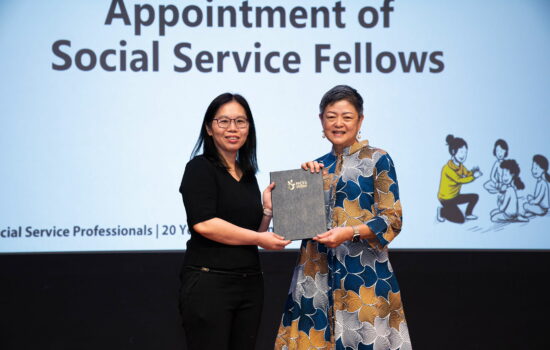A former managing director in the automotive industry, Mr Allan Tan experienced a devastating blow to his life three years ago.
“Stroke had [stolen] my life and career away from me. It wasn’t good at all. It was destructive and has affected my brain, walking, and talking as well,” he shared.
Since then, the 50-year-old often faces challenges in conversations as he struggles to plan and organise sentences, and finding the right words to say. At times, he would also veer off-topic without providing context, making it difficult for his loved ones to understand.
This condition is known as aphasia. It is an acquired communication disorder that happens when parts of the brain that control language are damaged after an injury, such as a stroke, brain tumour or head trauma. Aphasia affects a person’s ability to speak, write, read and sometimes understand words.
Some people with aphasia have expressive aphasia, which means they have difficulty expressing themselves. For those with receptive aphasia, they have difficulty understanding what is being said.
Helping Allan to Get Better
Allan experiences mainly expressive aphasia. When he was enrolled in SPD Rehabilitation Centre in November 2020, his speech therapist Ms Ng Yuan Hui worked with him on compensatory strategies to help him find the right words to say. These strategies include the use of alternative words, describing words, and using a mix of languages.
She also motivated Allan to think and plan his messages before sharing, as well as cues to recognise when his communication partner has not understood his message, and how to rephrase it.
To alleviate his financial burden, SPD also provided additional subsidy on top of the Government subsidy for Allan’s programme fees.
As Allan resides in a welfare home, it was logistically challenging for him to attend in-person therapy. Given that the activities and strategies involved in his intervention can be easily carried out online, Allan was able to receive his entire speech therapy intervention over telepractice.
“I was quite happy with [the progress made during the sessions] until I felt my [memory loss worsening]. I felt frustrated and depressed. It couldn’t [have] happened to me,” shared Allan, who has reported experiencing memory difficulties before he began his intervention at SPD. Over time, he became more concerned as he felt that his memory is deteriorating.
To help Allan with his memory difficulties, Yuan Hui introduced internal (e.g. forming associations, acronyms) and external memory aids (e.g. notebook, photos).
Support Network for Persons with Aphasia
Having a network of support is also critical for persons with aphasia in their recovery process. Under Yuan Hui’s encouragement, Allan joined the Aphasia SG, a community support group and attends it regularly to practise his conversational skills, share his stories and connect with other individuals with aphasia.
While participating in the support group, something a fellow participant said struck a chord with him: “She told me that [even though] I [had lost] some of my memory, I gained others instead. Which was right.”
How Allan Benefitted from Speech Therapy Intervention
With regular speech therapy intervention, Allan has made much progress in his expressive speech. He is now able to apply compensatory strategies effectively in his daily conversations when he struggles to find the words to use. He is also able to better plan and organise his messages so that his loved ones can understand him better.
After going through about a year of therapy, Allan has completed his course of speech therapy intervention in December last year.
“I [may not have recovered all of] my speech but I gained my friendship with Yuan Hui. Throughout the year, she has been very patient with me and I thank her for the work that she has done [to support me],” he said.
Tips to Interact with Individuals with Aphasia
- Use short, simple sentences when communicating but maintain a conversation manner appropriate for an adult.
- Rephrase or simplify what you said when the person has not understood.
- Give the person ample of time to talk.
- Use other forms of communication such as writing, drawing, or gestures etc to complement speech.
- Ask open-ended questions, but if you notice that the person does not understand or is unable to reply, ask fixed choice questions or yes/no questions instead.





